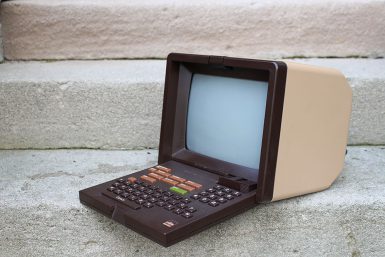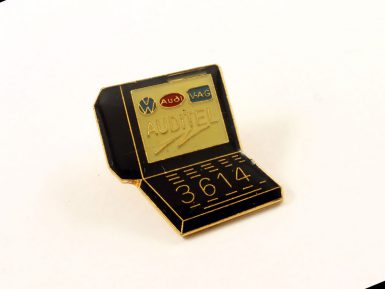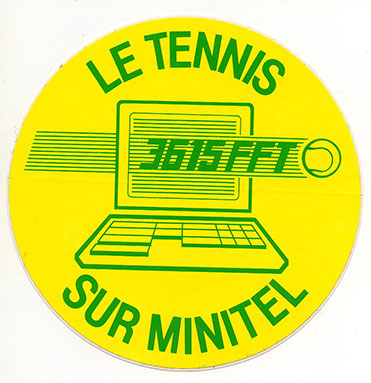Mailland-curated Minitel exhibit opens next week in NYC
Long before Americans experienced the internet, the French were already online chatting, shopping and playing video games.
Minitel, a computer network created in the late 1970s and popularized in France in the early ’80s, was one of the most successful pre-World Wide Web computer networks, and assistant professor Julien Mailland says there’s a lot to glean from it.

Mailland, author of Minitel: Welcome to the Internet, and his co-author and co-researcher Kevin Driscoll of the University of Virginia have repurposed their research and collection of Minitel artifacts into “Minitel All,” an exhibit that will run at the Ace Hotel in New York City from Nov. 6 to Dec. 16.
“It is significant, because it is the first time a computer network had full penetration at the retail level, all over the country,” Mailland said. “So, by the mid-’80s, basically all of France was online doing things that we do today like buying, chatting, playing video games.”
Minitel stayed online from 1982 — when it was introduced in France by the country’s administration of postal and telecommunications services — until 2012. Its shutdown was followed by attempts to recreate some of its services, said Mailland, who grew up in France using Minitel.

“We noticed that there was a lot of momentum and interest for people to kind of relive that culture of Minitel,” he said.
Mailland and Driscoll’s Minitel artifacts range from actual computer terminals to pop culture paraphernalia such as lapel pins, hats, shirts and posters, and records of people talking about Minitel.
“All different kinds of fads and pop culture phenomena of the time would have Minitel components to them,” Driscoll said.
The collection even includes songs whose lyrics mention Minitel. Driscoll is compiling a mix of Minitel-themed music, which will play during the exhibit’s opening reception.
In addition to galleries of such artifacts, the pair’s Minitel exhibit will also give visitors a slice of what the experience was like, with terminals where users can access a reconstructed Minitel chatroom.

“We’re recreating the cultural experience of going in these chatrooms in the ’80s,” Mailland said.
Although the concept of accessing such a chatroom might seem familiar, Mailland said the look of the interface might be alien to users familiar with the look and feel of the World Wide Web. Its text-dominant design is more like group chat apps or texting than modern websites, he said.
For Mailland and Driscoll, Minitel isn’t just a fun nostalgia trip.
Mailland, a telecommunications policy researcher, said he realized that law and policy issues important to the World Wide Web, such as net neutrality, privacy and regulation of online speech, had already been addressed in France in the 1980s.
“As a policy researcher, I thought It would be interesting to look at this historical case study to see how these laws and policies played out at the time,” Mailland said.
Unlike the modern internet, Minitel was private and protective of users’ personal data.
“What it shows you is that more different business models are possible for the internet than the business model which consists of having content seemingly for free but having all of your private life captured by Facebook,” Mailland said.
Driscoll said Minitel is important to understand, because it’s an example of a scenario where privacy was protected but development still thrived.

“People in the U.S. have tended to think about regulation as at odds with the development of new technologies,” he said.
He mentioned the Silicon Valley technology boom as an example of innovation thriving because it was unchecked. But Minitel struck a balance between public support and private investment in innovation.
“You have this public platform for private innovation,” Driscoll said. “You have this really unique balance.”
In conjunction with the opening of the exhibit, Mailland will give a lecture, “Platforms in the Public Interest: Lessons in Minitel,” Nov. 8 at Fordham University. The talk will address some of these lessons from Minitel that can be applied to internet policy today.
When Minitel first started, it was an unusual and niche service. It grew into a phenomenon so big it’s been researched, celebrated and turned into museum exhibits, both online and in New York City.
Mailland said it’s special because it can be both nostalgic and politically and culturally relevant. The exhibit will reflect that.
“The experience is meant to be both a fun, immersive experience,” he said. “And at the same time, it’s meant to provoke thoughts about the future of the internet.”

